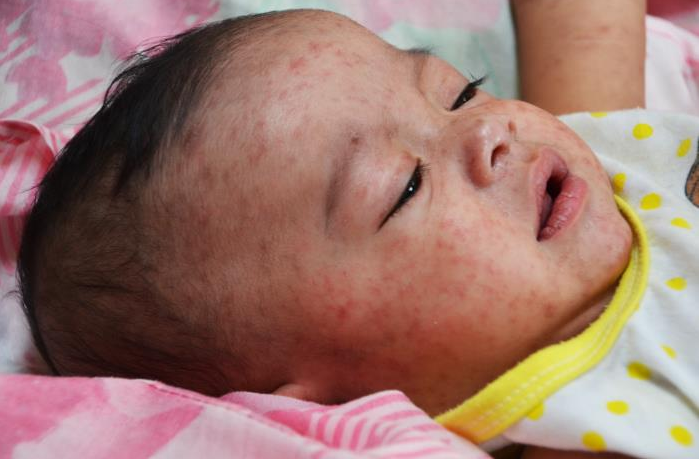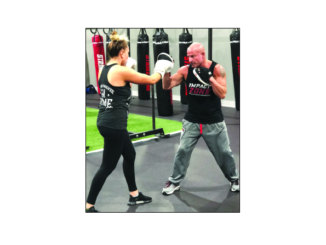
NORTHERN VALLEY AREA, N.J.—While two cases of visitors to Bergen County infected with measles—one in Englewood a year ago and one in Hillsdale in February—did not cause any additional cases of measles, health officials warn that the disease is highly contagious and urged vaccination for children and adults to help protect them.
Regional and local health officials have voiced concern recently about the spread of the disease that was was assumed to be eradicaed two decades ago and has spread rapidly in a nearby New York State county.
Fortunately, most children and adults in Bergen County have been vaccinated, health officials said, with a regional health official citing state health department statistics indicating that 95 percent of county residents have been vaccinated against measles.
The measles, mumps and rubella (MMR) vaccine is recommended for children, with a first dose at 12-15 months, and a second injection usually given at age 4-6.
“There have been a total of 14 measles cases this year. Of those, 12 have been associated with the ongoing outbreak in Ocean County (four of 12 relate to one household in Monmouth),” said Donna Leusner, DOH communications director, via email May 6 to Northern Valley Press.
She said one individual in Bergen County and one in Essex County complete the list of measles cases.
Leusner noted schools are required to track vaccination rates each year and those rates are audited by local health departments.
For adults or teens who have not received an MMR vaccination, health officials recommend getting the first vaccine shot as soon as possible, after checking with your medical professional, and a second dose within 28 days.
Younger children (6-11 months) who are traveling internationally are given the two routine vaccine doses, plus an earlier MMR dose, for a total of three shots, officials said.
Rockland County outbreak
Health officials warned that by early May, 215 cases of measles were confirmed in Rockland County, N.Y., mostly among the Orthodox Jewish population.
Statistics show 80 percent of those contracting measles had no vaccine, plus 12 percent were of “unknown status” regarding vaccination.
Only about 3 percent had two vaccine doses but contracted measles, said the Rockland County Health Department.
Several North Jersey health officials who talked to Northern Valley Press noted Rockland County’s proximity to Bergen County and asked area residents to be sure of their measles immunity.
If an infected person were to visit public areas or facilities, the measles virus could easily be transmitted to a dozen or more susceptible individuals, they said.
Measles ‘very contagious’
“Measles is a serious respiratory disease that causes a rash and fever. It is very contagious. People with measles spread the virus by coughing or sneezing into the air. You can catch the disease just by entering a room that an infected person visited two hours before,” said a state DOH spokesman.
A person infected with measles can pass on the disease for four days prior to a rash development and four days after the rash disappears,” said a state DOH spokesman.
Officials note individuals born before 1957 are likely to have been exposed to the virus and immune but those born in 1957 and later should check with a health care provider to determine their immunity.
Two doses of MMR vaccine provide 97 percent immunity and one MMR dose provides 93 percent immunity, officials said.
Englewood’s 99.3% rate
Englewood Health Director James Fedorko said recent surveys by the department found 99.3 percent of children in 20 city daycares and schools were immunized.
“Every year we have an immunization audit,” said Fedorko, who noted the department posts updated notices and information on its Facebook page.
In mid-April, Fedorko posted an update from the federal Centers for Disease Control and Prevention noting 555 cases of measles had been reported nationwide in 20 states, including New Jersey. By early May, the CDC reported 764 confirmed cases in 23 states, including 14 in New Jersey, the highest number of cases in 25 years, according to the CDC.
According to a CDC chart tracking measles cases nationwide since 2010, 667 cases were reported in 2014; 188 in 2015; 86 in 2016; 120 in 2017; 372 in 2018; and 764 cases reported as of May 3, 2019. Data are updated weekly by the CDC at its website, https://www.cdc.gov/measles/cases-outbreaks.html.
“Measles is so contagious that if one person has it, up to 9 of 10 people around them will also become infected if they are not protected. The virus can cause serious health complications, such as pneumonia or encephalitis, and even death,” said the CDC in a release April 30.
“The CDC continues to encourage parents to get their children vaccinated on schedule with the MMR vaccine. People 6 months and older should be protected with the (MMR) vaccine before leaving on international trips,” said a CDC news release.
“We’re part of the public health system and staying abreast of disease outbreaks in nearby communities is part of what we do. We help find the threats, respond rapidly and prevent new infections,” said Fedorko.
‘Affordable, available’
“The (MMR) vaccine is affordable, available and schools require it,” noted Fedorko.
He said of 5,920 local records audited, only 40 children took advantage of exemptions to vaccines: 33 for religious reasons and seven with medical exemptions.
New Jersey allows a child or adult to refuse vaccination based on a religious or medical exemption, said Fedorko. While a bill was introduced to limit and tighten exemptions, it has not been approved in either legislative chamber, according to published reports.
Nationwide, the CDC reported vaccination coverage for measles was about 94 percent among kindergartners in the 2017-2018 school year.
In 2000, the disease was considered eliminated in the U.S. but has resurged over the years as vaccination rates have fallen off in certain areas.
State’s 95% immunized
Health Officer Angela Mussela, Northwest Bergen Regional Health Commission, which serves seven Pascack and Northern Valley communities, said their health educator provides educational presentations on infectious diseases, including measles, to any group or town that requests one. The eductor can be contacted at: HealthEducation[at]nwbrhc.net.
She said because 95 percent of residents are immunized against measles, the county has “herd immunity” which helps to prevent widespread outbreak of a disease.
“The only thing people can do is to concentrate on what people can control. Find out whether you’ve been immunized, and if not get vaccinated,” said Musella. She suggested adults get a titer test from their doctor to find out if they possess antibodies to the disease.
Asked about individuals who don’t trust vaccines or believe vaccines cause severe side-effects, Musella said they are “a challenge” to health educators, but fortunately vaccination rates remain high in Bergen County, she said.
‘Very difficult to change’
“People who don’t believe in vaccination for their own reasons…it’s very difficult to change their minds. The only thing we can do is present the information and let them see the facts,” she said, noting a commission health educator offers question-and-answer presentations on vaccinations and related health concerns upon request.
She said because it’s such a “mobile society” with people traveling world-wide, more opportunity for an infectious disease such as measles to spread exists.
Commission Health Educator Chantal Folkes said she’s done five programs addressing measles, and other infectious diseases, directed at child daycare employees in 2019.
She said her program alerts employees to “signs and symptoms” to watch for in children who may have been exposed to measles. She said most children at daycares she visits are vaccinated. Folkes said measles symptoms include rash, high fever, cough, runny nose and red, watery eyes and may cause serious complications including pneumonia and encephalitis (brain swelling). Measles in a pregnant woman can lead to miscarriage, premature birth or a low-weight newborn, she said in a statement.
“Measles is easily spread through the air when someone sneezes or coughs. Anyone who has not been vaccinated or has not had measles is at risk if they are exposed,” added Christina Tan, state DOH epidemiologist.



